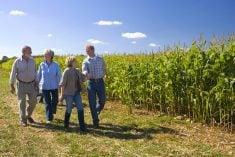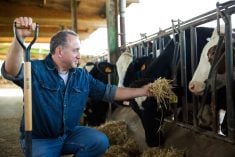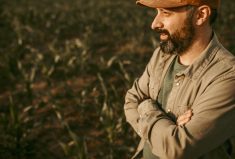John F. Kennedy’s historic words, “… ask not what your country can do for you, ask what you can do for your country,” may also contain the wisdom needed to solve the complexities of today’s family farm successions.
Too many young men and women are starting their discussions about the path to farm succession by asking the wrong question, says farm business consultant and succession expert, Merle Good.
Rather than asking what can the farm business do for them, they should be concerned with what they can do for the business.
Read Also

Riding the tariff rollercoaster
Farmers are accustomed to roller-coaster years. But the current geopolitical windstorm is something else entirely. On his cattle operation near…
The next generation should ask: What is the business looking for? What does it need? How can I add value?
Letting the business lead the often difficult path to succession will not only help you work your way to a better succession plan, it will set you up to make better decisions for your farm business in the long run, says Good, former farm business adviser with the Alberta agriculture ministry.
But most of all, Good says, making the business the focus of your discussion will help the younger generation get on the right page, and it will help them set reasonable expectations.
For Mom and Dad, meanwhile, it will help shift the discussion toward their asking themselves whether they’re being good business leaders, and away from the minefield of whether they’re being good parents. And, adds Good, “It’s no longer a conversation of what do Mom and Dad want, but rather a question of what does the farm business want and need.”
What does your farm business need?
“Before the business can lead the conversation, the farm business must first be defined as to what it is,” says Good.
In his experience, that can be eye-opening. The business needs to know what it consists of. In farming, of course, the business may consist of producing and selling grain, for instance, but that only means the business needs to have access to land, not necessarily that it needs to own that land.
That’s a crucial point, Good says, because it highlights the very important fact that the succession discussion has to be about the business, not about the estate.
In working with his farm clients, Good is very clear about this, saying the first step in defining what your business is and what it needs is to get a clear picture of the business, which means the business discussion must be separate from the parent’s estate plan before either generation can take an analytical look at their involvement.
Before the next generation can decide whether they want to come back to the business and make it their full-time career choice, they need to know what exactly is being talked about.
“The separation needs to be really clear,” says Good. “If the farm business is not separated from the estate, proper succession will never occur. An operational business separation plan absolutely needs to be put in place.”
Separating the farm business from personally owned assets is a must
Good says that separating the farm business from personally owned assets can be quite simple, since most farm assets are usually tied up in land. He suggests creating an operating company that owns some of, but definitely not all, the land.
Once this separation has occurred, the redemption of the parent’s equity must occur over time, and Good says it is essential that a formal plan be created and that a significant portion of income allocation occur as redemption of capital.
“This strategy helps most second generations, since the majority of this demographic would rather own a bigger piece of a smaller pie than a smaller piece of a bigger pie,” Good says.
“So if Mom and Dad have a $10-million corporate farm with everything in the company, they will be reluctant to give full ownership. However, if we take that farm and drop it to $4 million, with just cattle, machinery and some land — and kick $6 million of land to the side in a land corporation — the parent’s blood pressure will drop.”
Good says that with this approach to succession, once the operating company is established and the off-farm estate and land is off to the side, business succession can become the focus.
If farmland is being left to non-farm children (as is happening more often), then an access agreement, which usually includes a long-term lease, must be created. Good likes a rolling lease concept between family members, where each year an extension of one year is automatically added to the lease.
He says that it is important to remember that the operating business rarely wants to buy land. It’s only the owners who want see that as a benefit. The business would usually prefer to own cattle, machinery and inventory to make money.
Don’t fall into this trap
It’s a big question, says Good. What keeps the farm business up at night, especially as it relates to bringing in the next generation?
Often, it leads to another, equally important question: What can be done to create more income?
“The key factor in any farm business is income, and the focus of the business is to make income. Remembering this key factor defines the focus for both generations to strive towards the common goal of more income,” says Good. “Income generation needs to be a primary focus as you are bringing in a second person or family that needs to eat.”
It’s a discussion that also helps shed light on the estate questions discussed above. “When we talk about succession, it is an income game, whereas estate planning is an equity or wealth game,” Good says. “Because without sufficient income, you can’t run a successful business and make a living. The farm business is to create a career and, if it is successful enough, it will create the owners’ wealth.”
The common answer Good hears from farmers is that to create more income for their farm business, they need to buy more land. That, he says, doesn’t actually answer the question.
“My clients will often come to me and say, ‘my son or daughter can’t come home and farm with me because the farm isn’t big enough.’ What I tell them is that no, don’t fall into that trap. Big doesn’t necessarily equate to income.
“Where I recommend they focus is on their business plan and how it answers the question: What can we do to change and enhance the current farm business income?”
For example, Good asks them to think more along the lines of what crop or marketing approach they can adopt to build additional revenue. How can they make more income off of what they already have?
Then, once that determination is made, it’s time for the up and coming generation to say exactly how they can help make that happen.
Good also encourages the current generation of farmers to recognize the value that the next generation will offer the farm business.
“Of all the work that I have done in farm business planning and succession, what I have learned is that if you bring a second generation in that is primarily focused on really bringing value back into the farm business with energy, effort and skills, after three to five years with no change in the size of the farm land base, the farm income will go up at least 20 per cent.”
This is because the new generation will bring better marketing, advances in new technology and new approaches to the farm business operations, says Good.
There’s still more work to do. For instance, the farm will need a structure with clearly defined roles and responsibilities to support the succession plan, but the goal will be in sight, Good says. It will have taken effort, but now the expectations of both generations. have a pathway for being met. CG
The separation needs to be really clear,” says farm adviser Merle Good. “If the farm business is not separated from the estate, proper succession will never occur.”
The Big Question
When does the business model let me take ownership?
Ownership transition should start to happen when the next generation enters the manager level, farm adviser Merle Good tells his clients.
This means that having defined roles and responsibilities is important in order to set clear expectations, both for the farm business and for the next generation.
But, says Good, it also suggests that the key to long-term success for the next generation is ensuring that the business does not allow the next generation to become an owner/manager too soon.
“My best advice for a next generation that is anxious to move forward with next steps to succession of the farm business is to not become an owner too soon,” Good says. “That way you will avoid the carrot and the stick scenario. I tell my clients that as an employee and maybe even a key employee, don’t even talk about ownership yet. It isn’t going to happen.”
One of the truisms for the business, he says, is that before you become a manager, you simply can’t become an owner, since the business does not want you to become an owner until you have become responsible as a manager.
When you have been responsible for an area and have done a good enough job, that’s when it wants you to become an owner.
“It’s not what Mom or Dad wants you to be, in their mind they may want you to be an owner when you are born. It’s the business perspective and what the business needs. The business says until you are a manager you can’t have equity.”
“After all,” says Good. “It is what the business wants and needs that will best answer the question when it comes to succession. Letting your farm business lead the conversation and set the rules is the most effective and successful approach not only for the viability of the business, but also for keeping the ‘family’ in the family farm business.”
Where do you fit?
According to Good, a clear succession plan is best supported by first identifying operational roles and responsibilities in the farm business. Good suggests dividing roles and responsibilities into the following key areas:
- Employee — An employee takes direction.
- Key Employee — A key employee is responsible for a certain task.
- Owner/Manager — An owner/manager is responsible for a certain area. A manager receives advice.
- Lead – A lead is responsible to the business and accountable to the business and no one else. A lead asks for advice.















